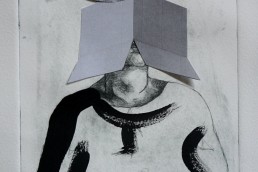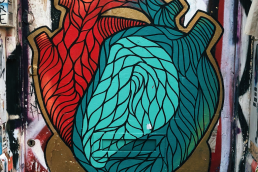Charlotte Eyres
Photography from Unsplash, Illustration by Ida Henrich.
Content Warning: mentions of bulimia
Charlotte Eyres discusses the pitfalls of seeing what we’re not in others and the positive opportunities we can design by viewing failure more constructively.
Failure is a weird one. So is success. Regarding the technicalities of the English language, the two reside as each other’s opposite. Expectedly then, they each possess a personality as either the positive attribute or the negative; failure possesses the latter. So now whenever success is not achieved, by whatever standard, one feels an array of negative emotions and in many cases decides that not only is the event a failure but they are the cause — and the only reason — for things going wrong; therefore a failure themselves. Here starts the drift of a dark fog over our eyes blackening the view of possibilities and dubbing ourselves ‘the creators of wrong’. Next, comes self-punishment.
But why is this? Why has failure gained such a bad rep that it now (so often) stops us from achieving success sooner than we would otherwise be able to? In my own experience I’ve been comfortable with my own failures and willing to progress forward or take another stab at success. That is, until our good friend ‘comparison’ comes into play.
Exhibit A: Results Day 2018.
To give some context, the last two years have not been easy. I’ve been fighting a battle with depression and bulimia and have struggled immensely with getting out of my head to focus on anything but my own downfalls. Therefore exam season was not my finest hour, as everything accumulated in an exclamation of “Why bother?”.
I decided to push the textbooks aside and try (at last) to focus on anything that made me any inch happier. Subsequently, any letter sealed inside the envelope was a success because despite everything working against me, it would mean I had made it through. To my surprise I read the grades A, B, and C. My eyes flickered between the grades and the name the letter was assigned to and eventually I was shocked. With the little amount of work I put in I came out with grades that weren’t half bad. Granted, my usual capabilities were beyond what I received but it was not a failure! Especially because of the context in which I was performing, it was nothing but a huge success and proof of my continued resistance against demons attempting to drag me down: all good so far.
To celebrate we went for a nice lunch; great wine, great food and great coffee to finish. Of course, we were not the only ones with a cause for celebration and across from us was another girl with her grades. I overheard of her success and my heart-dropped. (Hello, Comparison nice to see you!). They were higher. They were a string of As glistening with stars. They were not A, B, C and they weren’t mine. It was amazing how quickly the initial feeling of accomplishment vanished and how soon I entitled myself a failure. The act of comparison to someone else had no regard of my fight and made me lose my sense of it too. It diminished my success to a failure because I had not done as well as someone else who perhaps had an easier ride (again, I had no idea). I felt petty for feeling so down and even worse for causing offense to the woman I was a few months ago.
Whether we term something as an act of failure or success is often qualified by the accomplishments of those around us. This then tends to determine how we see our capabilities and ultimately ourselves. The fact is, what you do has to be examined in accordance to how you are — not to how anyone else did. We are not the same but we take universal tests so now wonder people perform differently. It is not a failure or success in terms of how you do compared to the people around you, it should all be judged by the reality of your situation and who you are. Also, failure is not negative. Engineers are constantly pushing proto-types to their limits, breaking them so that they know when something fails; from this they reform their blueprints and work towards an infallible design. We should see our own failures in the same way. By definition failures are things going wrong – not the world falling in on us. If, when we break, we look at why, we can reform ourselves psychologically (looking at the blueprint of our mindset) we can improve its design so that we are protected from the same thing going wrong. This may take a long time but perhaps it is then more likely that we can achieve success- whether that be in a practical performance or in a battle against the dark cloud above our head. Knowing that “I didn’t achieve” doesn’t mean, “I can’t” is vital and makes failure easier to digest and success more visible on the horizon.
Charlotte Eyres
Charlotte Eyres is currently studying History, Ethics and Philosophy and Music at A level. Having kept quiet about her struggle with eating disorders and depression for a long time, she has recently discovered the healing power of writing and sharing her experience to educate others and make some people feel less alone.
Ida Henrich
Ida Henrich is a German Cartoonist, Illustrator and Designer based in Scotland. She has worked with award winning publishers, online coaches and magazines. Ida is a graduate of Communication Design at the Glasgow School of Art where she specialised in Illustration. In her own work she explores themes such sex-education, growing up, and women’s experiences. Her comics and illustrations are written for both men and women and aims to start an open dialogue between partners, friends, parents, and children about their one’s own experiences. She believes that Art is a powerful way to make ideas and feelings tangible.
As Arts Editor Ida is responsible for all things visual at Fearless Femme including the correspondence with our visual artists, the design and realisation of the online magazine and the illustration of our amazing cover girls. She will also be creating artwork for some of our articles, poems and stories.
Ida loves her coffee in the morning, that feeling after finishing an illustration and going for a run in the (Scottish) sun; and pilates on the rainy days. Ida enjoys SciFi books and autobiographies, and autobiographical comics. She is always delighted to meet new people on trains but is also smitten being home alone colouring in an illustration that she has made way to intricate while listening to Woman’s Hour. You can contact her at ida@fearlessly.co.uk.









